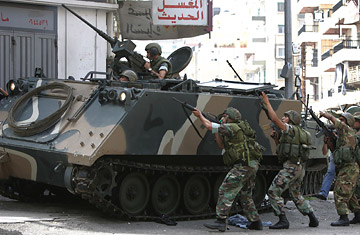
Lebanese soldiers, take up positions next to their APC armored personnel carrier during clashes with fighters from an Islamic militant group, in the north city of Tripoli, Sunday May 20, 2007.
(2 of 2)
Fatah al-Islam has recently begun establishing a presence in other refugee camps in Beirut and south Lebanon. Mohammed and other supporters of the group in Tripoli said that Fatah al-Islam's goal is to become the dominant Palestinian faction in Lebanon. Islamist sources in Tripoli said that Fatah al-Islam is being funded by Salafist supporters in the city, which allows them to win popularity in the refugee camps by providing social services. The crackdown on Fatah al-Islam, they say, is part of a broader attempt by the U.S.-backed Lebanese government to quell any sign of anti-American Sunni extremism.
As many as 200 people in Tripoli and north Lebanon were rounded up by Lebanese authorities last month and accused of ties to al-Qaeda, stockpiling weapons and planning attacks. "They were all innocent people," says Sheikh Ibrahim Salih, a prominent Salafist cleric in Tripoli. "They [the government] want to keep the Sunni street under control and to convince the Americans they are fighting terrorism."
Fatah al-Islam is headed by Shaker al-Absi, a veteran Palestinian guerrilla fighter who originally trained in the Syrian Air Force. He is believed to have fought American forces in Iraq and was linked to Abu Musab al-Zarqawi, the head of al-Qaeda in Iraq who was killed a year ago. Al-Absi was sentenced to death in absentia by a Jordanian court in 2004 for the murder of American diplomat Laurence Foley in Amman. His fighters reportedly number 200 to 500 and are drawn from several Arab countries.
They have proved a tenacious foe. In Sunday's street battles, several of the well-armed militants holed up in residential buildings in the Zaharieh district of central Tripoli firing machine guns and hurling grenades at Lebanese soldiers who sought cover behind armored personnel carriers on the street below. Soldiers battered the cramped apartment buildings with rifle and heavy machine gun fire, ripping chunks of masonry from the walls and filling the air with dust and acrid gun smoke. It was not until early evening that the army managed to kill the last of the militants.
Although a crowd of onlookers cheered as Lebanese troops poured machine gun fire into the buildings, one soldier grumbled that when the troops first arrived on the scene some local residents has tried to hide the militants. "They have supporters here," he said. The government is vowing to finish Fatah al-Islam once and for all, but the struggle to contain rising Sunni extremist sentiment in Lebanon promises to be a long battle.
